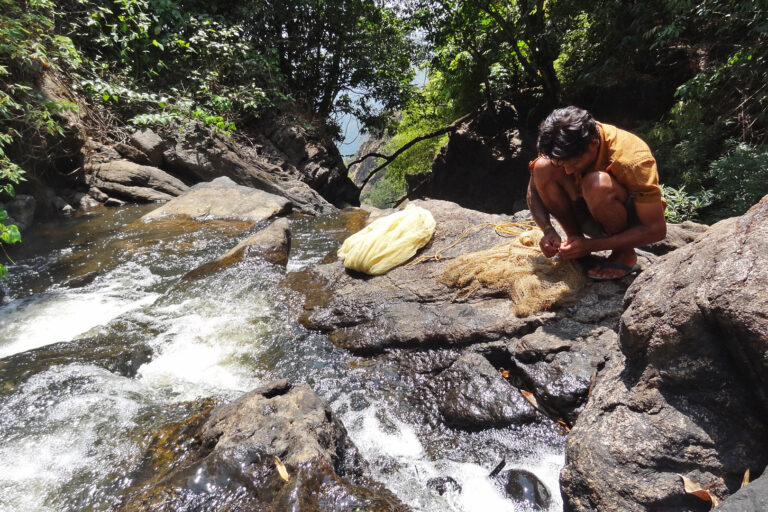- Thailand’s growing economy and low unemployment rates have caused most Thais to turn away from low-paid, labor-intensive work, leaving a gap to be filled by migrants — especially in the country’s $7 billion seafood industry, which has been rocked by revelations of widespread slavery.
- Aside from living under constant threat of deportation, those lacking papers have no access to formal legal protection and are easily exploited by employers, landlords, authorities and traffickers.
- One migrant from Myanmar tells of being tricked aboard a slave boat and forced to work for years before finally escaping and trying to rebuild his life in Bangkok.
This is the third piece in a three-part series on recruiting aboard Thai-run slave boats in the country’s fishing industry. Read the first two here and here.
As soon as he saw men wielding guns, he knew he was in trouble. Dressed in a stylish checkered shirt and speaking fluent English, a 29-year-old Burmese man who asked to be referred to as “John” for his safety, describes his arrival into Thailand nine years ago. “It was a nightmare,“ he said of his 10 months spent slaving with dozens of his countrymen who were sold into the fishing industry.
In a sector notorious for its prevalence of forced and bonded labor, migrants make up an estimated 90 percent of Thailand’s fishing industry workforce. Most hail from neighboring Myanmar, a country with extreme rural poverty and ongoing ethnic conflict.
Promised a job on an orange farm in Thailand, easy work for a former farmer such as himself whose family had fallen on hard times, John paid a broker to take him across the border.
“Once we crossed, everything changed,” he said. “I was really scared.”
A group of armed men awaited them. They piled John and some 30 others in the bed of a truck, one on top of another. The mirrors were covered, so they couldn’t see where they were headed. Men were defecating, the stench and lack of air a combination so toxic he thought he would die.
Seeking economic prosperity in Thailand, like so many before him, John had become the prey of human traffickers who often rely on deceit and trickery to staff the fishing industry.

Thailand’s growing economy and low unemployment rates have caused most Thais to turn away from low-paid, labor-intensive work, leaving a gap to be filled by migrants. Like the agricultural and domestic help sectors, Thailand’s $7 billion seafood industry depends on migrant labor from ASEAN neighbors Cambodia, Laos and Myanmar. Their citizens make up an estimated 10 percent of the country’s workforce.
Although Thailand thrives on migrant labor, those who supply it are the least protected and most vulnerable to human trafficking and labor exploitation. Workers from Myanmar make up an estimated 80 percent of Thailand’s migrant workforce and are thus most frequently subjected to abuse.
“I had no documents,” John said. “I was worried about facing the Thai authorities and what would happen.”
Although Thailand holds periodic migrant registration schemes, windows are short, and many migrants remain unregistered. A 2011 International Organization for Migration study found the vast majority of migrant fishermen on Thai fishing boats to be undocumented, having entered Thailand in violation of immigration laws.
Aside from living under constant threat of deportation, those lacking papers have no access to formal legal protection and are easily exploited by employers, landlords, authorities and traffickers.
Failure to curb widespread human trafficking and forced labor in the fishing industry has put Thailand in the hot seat in recent months. It received the lowest ranking in the U.S. State Department’s annual Trafficking in Persons report, and also faces a potential ban on seafood to the EU for illegal fishing in neighboring waters. Further pressure was added after the discovery of jungle trafficking camps in May, many of whose migrant captives were held for ransom and sold onto fishing boats.

At a port near Pattaya, a popular resort town in the Gulf of Thailand, John and his companions were loaded into a boat and forced to work for days on end at sea, sleeping in the ship’s hull on the barren floor. Once every fortnight, the boat would come to port to unload its cargo. There were no days off. “If you wanted a day off you’d get a punch,” he recalled.
Only the thought of escape gave John the strength to work 20 hours a day. Some men, he said, tied buoys to themselves and swam to shore, hoping for the best.
“We don’t know what happened to them, maybe they died; maybe they made it.”
During one stop at port, the boat’s controller caught a man trying to escape. He beat him in front of the others. “They told us, ‘This is what will happen to you if you try to leave’,” John said.
A 2010 study of migrant workers in Thailand by Human Rights Watch, an international NGO, found that rights violations are widely experienced by migrants in Thailand, particularly in the fishing industry. According to the report, the climate of impunity often causes migrants to suffer in silence out of fear of retribution and lack of trust in local officials and police. There was no law on John’s boat, and once off, he and his companions were rarely allowed to leave their basic dwelling.
John plotted his escape, waiting for what he described as “the perfect moment.”
Then it came. Nine months after his capture, John asked his controller for the maximum allowance, given when they went to shore — just 300 baht ($8) for 15 days of manual labor at sea. He and a friend were granted permission to buy beer.
John approached a police officer in the street. “I told him, ‘Arrest me and send me back to Burma’.” He clenched his fists together, putting them side-by-side in mock arrest. “He told me, ‘You’re a foolish man and I won’t arrest a foolish man’.” John suspects the officer was colluding with the authorities.
“Police are involved in protecting the people transporting and holding the men, and in taking money to look the other way,” Phil Robertson of Human Rights Watch Asia told Mongabay. Collusion among authorities, boat owners and traffickers is par for the course in this industry, he claimed.

John and his friend entered a restaurant and began speaking with a Burmese woman on staff. They explained their situation, begging for help. “She saw that we were suffering and helped us to get in a transport truck driven by Thai people.”
On arrival in Rayong, a coastal city between Bangkok and Cambodia, a taxi driver agreed to take them further to a Burmese community for the meager sum they had remaining. With the help of their countrymen, the pair was able to find work with a major Thai beer company. John delivered cargo to retailers, including 7-Eleven.
“That company was really nice because they would ferry us to and from work. They applied for our documents for us, and even paid us better.” John received 150 baht a day at a time when 250 baht was the legal minimum wage.
A 2013 study by the International Labour Organization found that on average, migrant workers are paid 25 percent less than Thailand’s legal minimum wage of 300 baht per day.
Eventually, John was able to receive his documents during one of Thailand’s periodic registration windows. He moved to Bangkok, where he now works in a carwash and attends English classes at DEAR Burma, a nonprofit language school for adults offering 43 classes in English and Thai.
‘To live with dignity and stand among the Thai people’
It’s Sunday and school is in session. A larger-than-life photo of King Bhumibol Adulyadej flanked by colorful flags decorates the exterior of the government building the school is allowed to use. In the parking lot, a group of teenage girls practice a traditional dance of the Karen tribe. The school has become a social destination for migrants from Myanmar, as well as a place of learning since it opened its doors 13 years ago.

The open-air ground floor of the building doubles as a classroom and canteen for 50 students. A chorus of voices repeats Thai words as Myint Wai, a Burmese man who fled his homeland during the political upheaval of the 90s, discusses the benefits of learning the language as a migrant worker.
“When they study Thai, they can interview with foreign employers and be able to communicate if they are being treated unfairly,” he explained. According to Wai, many Thai employers, particularly in the domestic sector, often break the law by not properly registering their employees.
At present, 980 students are enrolled in the school, down 200 pupils from last semester. Wai feels the drop in attendance is due to increased tuition fees, which were raised from 500 baht per student to 700 baht when the school lost a main donor. That small bump can dissuade students from participating, he said.
“Even just to come here every week can be a lot,” Wai said. “They also need transportation and lunch fees.” Most have limited free time and often travel long distances to join. Some come from as far as Ayutthaya, Thailand’s former capital, a two-hour journey by public transportation.

In addition to language classes, the school emphasizes civil education, holding regular meetings to teach students their rights as employees. “A lot of workers don’t know their rights as laborers,” Wai said. “Giving information about labor laws and labor unions is very important. When we are talking about the Thai government’s impractical policies about migration, our people’s long-term awareness needs to improve so they can also advocate for themselves.
“We want students to live with dignity and stand among the Thai people.”
John agrees. “Here we can share our experiences. So many migrant people don’t know about labor rights and many learn here for the first time. They can then ask for their rights in work. After I started learning languages, my life definitely improved.”
Above all, John hopes to play a role in combatting human trafficking. “I know many people are suffering on the sea or in the home, and there are many kinds of trafficking in Thailand and around the world,” he said. “We can only start with our society, especially here in Thailand.”
Follow Sarah Hucal on Twitter: @SarahHucal













